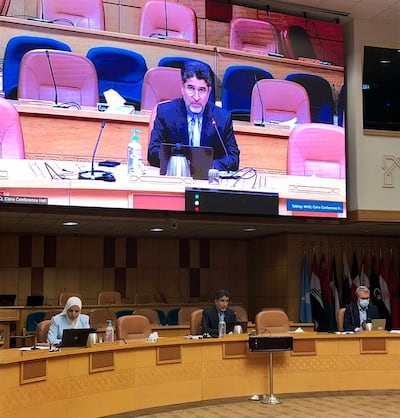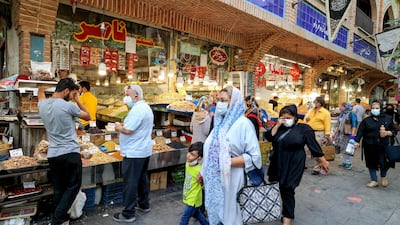Most countries in the Middle East reported a fall in the number of coronavirus cases and deaths in recent weeks, the World Health Organisation said on Wednesday.
“Thankfully, we have observed a decline this week and last week, compared with the previous one,” Dr Ahmed Al Mandhari, WHO regional director for the Eastern Mediterranean, said during an online briefing.
Case numbers declined by 16 per cent and deaths by 8 per cent in the WHO's Eastern Mediterranean region, which comprises 21 countries and the occupied Palestinian territories – a population of about 679 million people.
Dr Al Mandhari said that “the situation remains fragile and unpredictable”.
Five territories in the region – Egypt, the Palestinian territory, Somalia, Syria and Yemen – are reporting surges in coronavirus cases and deaths.
The Eastern Mediterranean region has reported a total of more than 15 million confirmed cases and in excess of 278,000 deaths.
Variants of concern, low take-up of public health measures and insufficient vaccination coverage because of limited distribution are all challenges that plague the Middle East, Dr Al Mandhari said.
“There are no shortcuts. We can break the chain of Covid-19 transmission only when we apply all available measures at once,” he said.
There are four main variants of concern across the region – Alpha, Beta, Delta and Gamma.
The highly contagious Delta variant, which has been detected in 163 countries, is in at least 16 countries in the region, the WHO said.
Nine countries in the Middle East will not meet the WHO global target of vaccinating 10 per cent of the population by the end of this month, Dr Al Mandhari said.
The WHO has set further vaccination targets of 40 per cent by the end of this year and 70 per cent by the middle of next year.
Globally, almost 90 per cent of high-income countries have now reached the 10 per cent target, and more than 70 per cent have reached the 40 per cent target. Not a single low-income country has reached the minimum target.
In the region, some countries have vaccinated less than 1 per cent of their populations, while others reached 75 per cent, Dr Al Mandhari said.

Dr Richard Brennan, WHO regional emergency director for the Eastern Mediterranean, said countries should refrain from offering booster shots in the interest of vaccine equity.
“Given the shortage of vaccines and the fact that some of the most vulnerable people in lower income countries have not been vaccinated, we’re asking that the third doses not be administered at this stage and that the available vaccines be equitably distributed,” he said.
The region has so far received about 51 million vaccine doses through the Covax programme for equitable distribution out of 89 million doses allocated.
Iran, which has the highest number of cases and deaths in the region, received its fourth Covax shipment on Saturday, taking the total to nearly 9.7 million doses.
The country of 85 million has reported a total of more than 5.3 million cases and 115,000 deaths.
“The trend is showing a decrease in the last few days,” said Dr Syed Hussain, the WHO representative in Iran, at the briefing.
On Tuesday, the number of daily positive cases was 22,329, a decrease of 212 cases from the previous day.
The number of deaths was 408, a decline of 40.
Iran has fully vaccinated about 14 per cent of its population, reaching a daily vaccination rate of more than 1.2 million people.
It will be able to reach or surpass the WHO targets “if the current flow of vaccines from Covax and other sources is maintained”, Dr Hussain said.
The Iranian Food and Drug Administration has approved two locally produced vaccines for emergency use, COVIran Barekat and Pasteurcovac. About half a million doses have been made available.
But Dr Hussain said vaccination will not be enough to end the pandemic in Iran, noting that the country's five Covid-19 waves coincided with festivities, elections or religious gatherings.
"The community’s willingness to apply the public health measures needs to be much more enhanced, and that will be the key to stop the circulation of the virus," Dr Hussain said.


